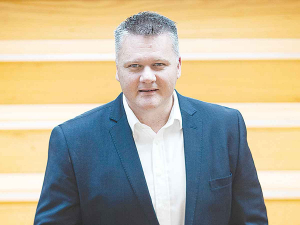Battle for milk
OPINION: Fonterra may be on the verge of selling its consumer business in New Zealand, but the co-operative is not keen on giving any ground to its competitors in the country.
 Fonterra chief executive Miles Hurrell has warned suppliers that many of its key customers have sustainability requirements that the co-op must meet and improve upon or risk losing their business.
Fonterra chief executive Miles Hurrell has warned suppliers that many of its key customers have sustainability requirements that the co-op must meet and improve upon or risk losing their business.
Fonterra has told its farmer shareholders that on-farm sustainability must improve further or the co-op could lose $300 million of annual business from key customers.
The co-op says sustainability on farm is a fundamental requirement for most of its customers now.
In an email to farmer shareholders last week, Fonterra chief executive Miles Hurrell said many of its key customers have sustainability requirements “that we must meet and improve upon, and they regularly check up on us”.
“Collectively these customers represent over $2 billion in revenue annually and it’s estimated that approximately $300 million could be at risk if we do not meet their expectations.”
Hurrell made the comments as he announced a new milk payment linked to higher quality milk from supplying farms.
The new maximum payment of 10c/kgMS will be paid from the next season to farms meeting the co-op’s on-farm sustainability and value targets.
Presently, Fonterra farmers producing milk with lower somatic cell counts receive Farm Source dollars that can be redeemed at its stores. The new payment replaces Farm Source dollars and will be funded out of the farmgate milk price.
“The total farmgate milk price will remain the same across the cooperative, but the amount that each individual farm is paid will vary depending on their contribution,” says Hurrell.
“We’ve always paid our farmers based on the value that milk provides to the cooperative. The reality is that the drivers of value are changing, and we need to reflect that. Our customers want to know that the products they are buying are not only safe, but also produced sustainably.
“This payment helps us meet the changing needs of our customers, so they continue to choose our milk and enjoy dairy as a sustainable and nutritious choice.”
Hurrell says Fonterra is now seeing customers from across the globe requiring it to not only meet and improve upon their requirements, but also provide proof of completion.
“The risk is that these customers will move to competitors if they can demonstrate better performance, or a substitute for non-dairy products with lower footprints,” he says.
Nestlé spokesman Robert Erhard says at the world’s largest dairy company, how milk is produced matters.
“Now more than ever, people expect farmers to act as good stewards of the land – safeguarding the climate, enhancing animal welfare and carefully managing water and the health of soils.”
Northland farmer Terence Brocx says farmers put in a lot of effort to produce the best quality milk possible.
“Over recent years, large numbers of farmers have spent a significant amount of time and money to improve their local environment and waterways to make their farms sustainable for the future.
“It’s great to see these farmers distinguished and rewarded for their efforts to produce and deliver a product that Fonterra can capture the highest value from,” says Brocx.
The World Wide Sires National All Day Breeds Best Youth Camp Best All Rounder plaudit has become family affair, with 2026 Paramount Cup winner Holly Williams following in her sister Zara's footsteps.
DairyNZ is giving New Zealand farmers a unique opportunity to gain hands-on governance and leadership experience within the dairy sector.
Herd improvement company LIC has posted a 5.2% lift in half-year revenue, thanks to increasing demand for genetics.
According to the latest Fresh Produce Trend Report from United Fresh, 2026 will be a year where fruit and vegetables are shaped by cost pressures, rapid digital adoption, and a renewed focus on wellbeing at home.
The Roar is a highlight of the game hunting calendar in New Zealand, with thousands of hunters set to head for the hills to hunt male stags during March and April.
OPINION: The past few weeks have been tough on farms across the North Island: floods and storms have caused damage and disruption to families and businesses.

OPINION: Meanwhile, red blooded Northland politician Matua Shane Jones has provided one of the most telling quotes of the year…
OPINION: This old mutt has been around for a few years now and it seems these ‘once in 100-year’ weather…